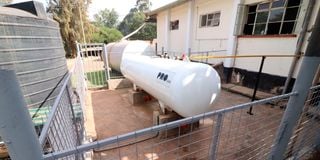Premium
Azimio MPs: Schools’ cooking gas project a scandal in waiting

A cooking gas tank at Alliance High School on March 8, 2021. The project to provide LPG to schools has the hallmarks of a major scandal waiting to unfold, Azimio lawmakers claim.
The Azimio la Umoja One Kenya Coalition Party leadership in the National Assembly has raised the red flag over the government's plan to divert over Sh2.5 billion from the anti-adulteration levy into a project that will make it mandatory for all public boarding schools to switch to cooking gas in a bid to protect the environment.
National Assembly Minority Leader Opiyo Wandayi (Ugunja) and Vihiga Senator Godfrey Osotsi said the project needs serious interrogation to ensure that it’s above board and “does not serve to benefit a few at the expense of others.”
“This is a policy issue that requires thorough interrogation by way of public participation and should not be rushed. Protecting the environment through alternative means of cooking other than using firewood is good but they should not hide under environmental protection to benefit themselves at the expense of the people,” warned Mr Wandayi.
There are over 5,000 public boarding schools in the country. In February this year, President William Ruto issued a directive that all public boarding schools should switch to cooking gas by 2025.
To implement the directive, the Energy Committee of the National Assembly has already approved an additional Sh500 million in the 2023/2024 financial year towards funding the cooking gas project. The committee has also undertaken to amend all the relevant laws.
This comes as it emerged that individuals with connections have registered a private company and teamed up with an oil multinational with eyes on the billions of shillings to be made once the project kicks off.
Mr Wandayi said “what stinks is the idea to make the lucrative project exclusive to a few people.”
The plan is to amend the Energy Act of 2019 and the Miscellaneous Fees and Levies Act of 2016.
The changes to the Energy Act will criminalise the use of firewood as cooking fuel in public boarding schools while the Miscellaneous Fees and Levies Act will convert the anti-adulteration levy imposed at Sh18 per litre of kerosene to boost cooking gas supply in the schools.
The anti-adulteration levy was introduced through the 2018 Finance Act as a means of checking individuals or companies that mix kerosene with diesel and sell to unsuspecting customers. Already, a gas cylinder manufacturing plant is being set up in Kajiado to produce at least 50 kilogramme cylinders that will then be filled with gas by the oil multinational for distribution to the schools.
Interestingly, a top official at the multinational had issues with President Uhuru Kenyatta’s administration and, at one point, was deported only to return after last year’s General Election.
“Alarm bells are ringing and this should concern everyone. Above all, any policy or legal framework that creates a monopoly situation should not be entertained,” said Mr Wandayi. He added: “I will be making a more comprehensive statement on this matter in the coming days.”
Mr Osotsi said the conception of the project has all the machinations of a big scandal in the making “that will only deprive Kenyans off their toil and hope for a better future.”
“The government should disclose to Kenyans all the details around the project including how the private company was procured to manufacture the cylinders and how the multinational oil company was identified. I am concerned because public money is involved,” said Mr Osotsi.
The Energy Committee has already indicated that it will fast-track amendments to the two laws to ensure the schools get cooking gas.
Mwala MP Vincent Musyoka, who chairs the Energy Committee, said that a review of the laws will secure the Sh2.5 billion every financial year to support the cooking gas project in schools. Mr Musyoka spoke while appearing before the National Assembly Budget and Appropriations Committee last week to present his committee’s report on the consideration of the budgets for the ministries of Energy and Petroleum for the 2023/2024 financial year.
“We need to amend the laws to earmark this levy for the provision of cooking gas to boarding schools,” Mr Musyoka said, adding: “Clean cooking gas for boarding schools, if implemented, would contribute to green energy economy and positive environment management.”
The Mwala MP noted that, since the anti-adulteration levy came into force, adulteration of diesel with kerosene has reduced because the prices of the two commodities are almost the same.
“We need to use this money to provide affordable cylinders,” said Mr Musyoka.




